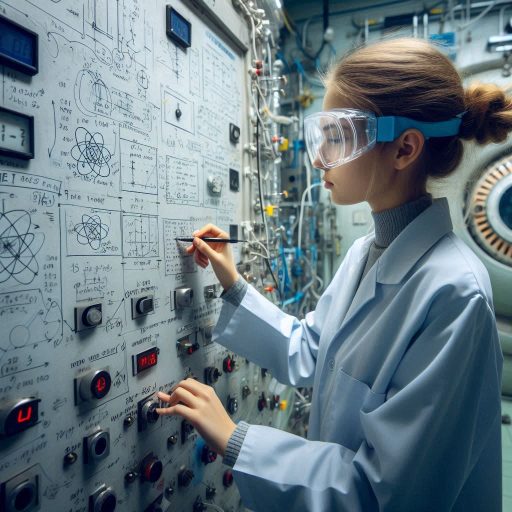Introduction
Forensic science is a multidisciplinary field that applies scientific principles to criminal investigations and legal processes.
It encompasses various specialties, including biology, chemistry, and computer science, to analyze evidence from crime scenes.
Forensic scientists use these techniques to collect, preserve, and interpret physical evidence, which plays a crucial role in the criminal justice system.
Their work often serves as a bridge between science and the law, making it possible to transform raw data into actionable insights.
The importance of forensic scientists in the criminal justice system cannot be overstated.
They provide essential support to law enforcement agencies by helping to solve crimes and ensuring that justice is served.
Through meticulous evidence analysis, forensic scientists help establish connections between suspects and crimes, providing a foundation for investigations.
Their findings can significantly influence court proceedings, helping juries and judges understand complex scientific data in an accessible way.
This blog post aims to explore the top skills required for forensic scientists.
Understanding these skills is crucial for anyone interested in pursuing a career in forensic science.
Whether analyzing fingerprints, studying toxicology reports, or providing expert testimony in court, forensic scientists rely on a diverse skill set to navigate the complexities of criminal investigations.
Education and training requirements for forensic scientists
Forensic science is a fascinating field that combines scientific principles with investigative techniques to solve crimes.
Forensic scientists play a crucial role in the criminal justice system by using their expertise to analyze evidence and provide valuable insights into criminal cases.
To excel in this profession, individuals must possess a unique set of skills and qualifications.
Bachelor’s degree in forensic science, biology, chemistry, or related field
One of the primary educational requirements for aspiring forensic scientists is a bachelor’s degree in a relevant discipline such as forensic science, biology, chemistry, or a related field.
This foundational education provides students with a strong understanding of scientific principles, laboratory techniques, and forensic analysis methods.
Advanced degrees (master’s or Ph.D.) for specialized areas
While a bachelor’s degree is the minimum requirement for entry-level positions in forensic science, many professionals choose to pursue advanced degrees to specialize in a particular area of the field.
A master’s or Ph.D. can help forensic scientists develop expertise in disciplines such as forensic biology, forensic chemistry, or digital forensics.
On-the-job training and certification programs
In addition to formal education, forensic scientists often undergo on-the-job training to learn specialized techniques and procedures.
Many employers require forensic scientists to obtain certification from professional organizations to demonstrate their competency.
Certification options include the American Board of Criminalistics and the American Board of Forensic Document Examiners.
Overall, a combination of education, training, and certification is essential for forensic scientists to build a successful career in this challenging and rewarding field.
By acquiring the necessary skills and qualifications, individuals can make meaningful contributions to the criminal justice system and help bring justice to victims and their families.
Analytical skills needed for forensic scientists
When it comes to the field of forensic science, analytical skills are crucial for success.
Forensic scientists are responsible for analyzing complex data and evidence to uncover the truth behind a crime.
Here are some key analytical skills needed for forensic scientists
Ability to Interpret Complex Data and Evidence
Forensic scientists must have the ability to interpret and make sense of complex data and evidence collected from crime scenes.
This involves analyzing fingerprints, DNA samples, ballistics, and other forensic evidence to uncover clues that can help solve a case.
Without strong analytical skills, forensic scientists may struggle to piece together the evidence and draw accurate conclusions.
Attention to Detail in Analyzing Evidence
Attention to detail is essential for forensic scientists, as even the smallest piece of evidence can make a significant difference in solving a case.
Whether examining trace evidence or analyzing digital data, forensic scientists must be meticulous in their approach to ensure that no detail goes unnoticed.
This attention to detail is what ultimately separates a good forensic scientist from a great one.
Problem-Solving Skills to Solve Complex Cases
Forensic science often involves solving complex cases that require innovative solutions.
Forensic scientists must possess strong problem-solving skills to connect the dots between evidence, identify patterns, and ultimately piece together the puzzle of a crime.
By thinking critically and creatively, forensic scientists can navigate the challenges of each case and arrive at accurate conclusions.
Basically, the analytical skills required for forensic scientists are vital to their success in solving crimes.
By honing their ability to interpret complex data, paying attention to detail in analyzing evidence.
Utilizing problem-solving skills to crack complex cases, forensic scientists can make significant contributions to the field of forensic science.
Read: How Climate Change Is Impacting Plant Research
Critical thinking skills required in forensic science
Ability to Form Logical Conclusions Based on Evidence
The process of forming logical conclusions starts with gathering evidence.
Forensic scientists collect samples, including fingerprints, DNA, and fibers.
They then analyze this evidence using scientific methods.
By applying rigorous techniques, they ensure accurate results.
Logical reasoning helps them connect the dots between different pieces of evidence.
Evaluate and Analyze Evidence Objectively
Forensic scientists also possess the skill to evaluate and analyze evidence objectively.
They must remain impartial throughout their investigations.
This objectivity allows them to focus on the facts rather than personal biases.
They use various analytical methods to assess the evidence’s reliability and relevance.
Statistical analysis often plays a significant role in this evaluation.
When examining evidence, forensic scientists rely on their training and experience.
They apply established protocols to ensure consistency and accuracy.
By adhering to scientific principles, they minimize errors in their analyses.
Their objective evaluations contribute to the integrity of the judicial process.
Think Critically Under Pressure in High-Stakes Situations
Another critical skill for forensic scientists is the ability to think critically under pressure.
High-stakes situations often arise during investigations.
Forensic scientists must remain calm and focused in these moments.
Their ability to think on their feet can lead to crucial breakthroughs.
They often work in fast-paced environments where time is of the essence.
In the field, forensic scientists may encounter unexpected challenges.
They must adapt quickly and find solutions to complex problems.
Critical thinking enables them to evaluate different scenarios and outcomes.
This skill is essential when presenting evidence in court.
Forensic scientists must convey their findings clearly and confidently.
The combination of logical reasoning, objective analysis, and critical thinking sets successful forensic scientists apart.
They understand that their conclusions can influence the lives of individuals involved in a case.
Their expertise helps law enforcement agencies solve crimes effectively.
To develop these skills, aspiring forensic scientists should pursue relevant education and training.
Many universities offer specialized programs in forensic science.
Internships and hands-on experiences provide invaluable opportunities for skill development.
Therefore, forensic scientists must master various skills to succeed in their field.
The ability to form logical conclusions, evaluate evidence objectively, and think critically under pressure are essential.
These skills contribute to their effectiveness in solving crimes and ensuring justice.
By honing these abilities, forensic scientists can make a lasting impact on the criminal justice system.
Read: Exploring the Different Branches of Geology
Technical Skills Necessary for Forensic Scientists
Proficiency in Using Specialized Equipment and Instrumentation
Forensic scientists rely heavily on specialized equipment and instrumentation.
They use tools like microscopes, spectrometers, and chromatographs daily.
Mastering these instruments is essential for accurate evidence analysis.
Proficiency allows scientists to identify substances and determine their chemical makeup effectively.
Understanding how to operate this equipment involves extensive training.
Forensic scientists must also stay updated on advancements in technology.
New tools often enhance efficiency and improve accuracy.
Regular calibration and maintenance of equipment ensure reliable results.
Moreover, forensic scientists often work in high-pressure situations.
They must quickly deliver precise analyses while adhering to strict protocols.
Handling hazardous materials is common in forensic labs.
Safety training becomes crucial to prevent accidents and injuries.
Awareness of safety guidelines protects both the scientist and the integrity of the evidence.
This proficiency not only aids in personal safety but also preserves the quality of the analysis.
Knowledge of Forensic Software for Data Analysis
Data analysis is a critical component of forensic science.
Forensic scientists utilize specialized software to interpret complex data sets.
This software helps them draw meaningful conclusions from raw data.
Familiarity with forensic software enhances a scientist’s analytical capabilities.
Commonly used programs include statistical analysis tools and database management systems.
These tools allow scientists to track evidence, manage case files, and generate reports.
Proficiency in these applications ensures efficient data handling.
It also improves collaboration with law enforcement agencies and legal teams.
Moreover, forensic software often includes features for visualizing data.
This visualization helps in presenting findings clearly to non-technical audiences.
Effective communication of results is vital in legal proceedings.
Therefore, understanding how to use this software becomes indispensable for forensic scientists.
Understanding of DNA Analysis Techniques
DNA analysis is a cornerstone of forensic science.
It plays a crucial role in identifying suspects and victims.
Forensic scientists must be well-versed in various DNA analysis techniques.
These include Polymerase Chain Reaction (PCR) and Short Tandem Repeat (STR) analysis.
Mastering these techniques requires rigorous training and practice.
Forensic scientists must understand the principles behind DNA extraction and amplification.
This knowledge allows them to troubleshoot issues during analysis effectively.
Furthermore, they must stay current with advances in DNA technology.
New methods often emerge, offering more accurate results and faster processing times.
Ethical considerations also surround DNA analysis.
Forensic scientists must understand privacy concerns related to DNA evidence.
They play a vital role in ensuring that genetic information is handled responsibly.
Adhering to legal and ethical guidelines protects the rights of individuals involved in cases.
In review, proficiency in specialized equipment, knowledge of forensic software, and understanding DNA analysis techniques are crucial for forensic scientists.
Mastery of these skills enhances their ability to solve cases effectively and contribute to the justice system.
Continuous education and training in these areas will further advance their careers and the field of forensic science.
Read: Top Skills Needed for a Successful Geology Career
Transform Your Career Today
Unlock a personalized career strategy that drives real results. Get tailored advice and a roadmap designed just for you.
Start Now
Communication skills for forensic scientists
Ability to Write Detailed Reports and Findings
One essential skill forensic scientists must possess is the ability to write detailed reports and findings.
These reports serve as a comprehensive record of their analyses.
Forensic scientists must clearly articulate their methods, results, and interpretations.
Well-structured reports ensure that law enforcement and legal teams understand their findings.
These documents can make or break a case, influencing decisions made by judges and juries.
A well-prepared report reflects the forensic scientist’s attention to detail and professionalism.
Effective Communication with Law Enforcement, Legal Teams, and Peers
Effective communication with law enforcement, legal teams, and peers is another vital skill.
Forensic scientists often collaborate with various professionals.
They must convey complex scientific concepts in simple terms.
Clear communication helps build trust and fosters teamwork.
Forensic scientists frequently participate in meetings and discussions.
They present their findings and explain their significance to investigators and lawyers.
This interaction is crucial for the successful resolution of cases.
Additionally, effective communication extends to both written and verbal forms.
Whether through reports or presentations, clarity is paramount in conveying critical information.
Testimony in Court as an Expert Witness
Testifying in court as an expert witness is a critical aspect of a forensic scientist‘s role.
In this capacity, they must present their findings confidently.
The ability to articulate complex scientific processes is essential when addressing juries.
Forensic scientists must explain their work in a manner that is understandable.
Jurors may not have a scientific background, so clarity is key.
They need to remain calm and composed under pressure.
Cross-examinations can be challenging, and they must defend their methods and conclusions.
In court, forensic scientists must demonstrate their expertise.
This expertise involves extensive knowledge of their specialized field.
They often draw from years of education and practical experience.
Their credibility hinges on their ability to present accurate information.
A well-prepared expert witness can significantly influence a case outcome.
Therefore, continuous learning and staying updated on advancements are vital in maintaining this expertise.
In summary, forensic scientists require a diverse skill set.
Their ability to write detailed reports, communicate effectively, and testify confidently plays a significant role in the justice system.
By honing these skills, they contribute to the pursuit of truth and justice in our society.
Read: The Future of Botany: Emerging Fields and Innovations
Ethics and integrity in forensic science
When it comes to the field of forensic science, ethics and integrity play a crucial role in maintaining the credibility and reliability of the process.
Forensic scientists are often entrusted with sensitive information and tasked with analyzing evidence that can have a significant impact on legal proceedings.
Therefore, it is essential for forensic scientists to abide by ethical standards and principles to ensure the integrity of their work.
Adherence to ethical standards and principles
Forensic scientists must adhere to a strict code of ethics to maintain the highest levels of professionalism and integrity in their work.
This includes conducting their analysis with honesty, objectivity, and impartiality.
By following established ethical guidelines, forensic scientists can ensure that their findings are based on sound scientific principles and are free from bias or personal interest.
Objectivity and impartiality in analyzing evidence
One of the primary responsibilities of a forensic scientist is to analyze evidence in an unbiased and impartial manner.
This means that they must set aside any preconceived notions or biases and focus solely on the scientific analysis of the evidence at hand.
By approaching their work with objectivity and impartiality, forensic scientists can ensure that their findings are reliable and accurate.
Respect for confidentiality and privacy of individuals involved in cases
Forensic scientists often work with sensitive information and data related to criminal investigations.
It is therefore essential for them to maintain the confidentiality and privacy of the individuals involved in these cases.
This includes handling information with care, obtaining consent when necessary, and ensuring that sensitive data is stored securely.
By upholding the privacy rights of individuals, forensic scientists can build trust with their clients and stakeholders.
Overall, ethics and integrity are integral aspects of the work of forensic scientists.
By adhering to ethical standards, maintaining objectivity in their analysis, and respecting the confidentiality of individuals.
Forensic scientists can uphold the credibility and trustworthiness of their work in the field of forensic science.
Explore Further: Ecological Impact Studies: The Botanist’s Role
Collaboration and Teamwork in Forensic Science
Collaboration with Law Enforcement Agencies and Other Forensic Experts
Forensic scientists play a crucial role in criminal investigations.
They often collaborate closely with law enforcement agencies.
This collaboration is vital for effective case resolution.
Forensic experts gather and analyze evidence from crime scenes.
They provide essential insights that help law enforcement understand the case.
Effective communication is key in these collaborations.
Forensic scientists must clearly articulate their findings.
They must ensure that law enforcement understands the significance of the evidence.
This clarity helps investigators make informed decisions.
Collaborative efforts streamline the investigation process.
They can lead to quicker resolutions and successful prosecutions.
Working with law enforcement agencies requires mutual respect.
Forensic scientists bring specialized knowledge to the table.
They must recognize the expertise of law enforcement personnel.
Understanding each other’s roles enhances the collaboration.
A shared goal of seeking justice unites these professionals.
This collective mindset strengthens the investigation process.
Effective Teamwork in Multidisciplinary Case Investigations
In addition to law enforcement, forensic scientists often team up with other experts.
These may include medical examiners, toxicologists, and crime scene investigators.
This multidisciplinary approach enriches the investigation.
Each expert contributes unique insights and skills.
Their combined efforts enhance the overall quality of the investigation.
Effective teamwork is essential in complex cases.
Forensic scientists must work seamlessly with various professionals.
They often coordinate efforts to solve intricate cases.
Each team member’s input is valuable in building a comprehensive understanding of the evidence.
This collaboration fosters an environment of learning and growth.
Sharing Knowledge and Expertise with Colleagues for Case Resolution
Knowledge sharing among colleagues is crucial in forensic science.
Forensic scientists regularly attend workshops and conferences.
These events facilitate the exchange of ideas and techniques.
Sharing knowledge enhances individual and collective expertise.
It also helps forensic scientists stay current with emerging trends.
Continuous learning benefits not only the professionals but also the cases they handle.
Forensic scientists often mentor junior colleagues.
This mentorship builds a foundation for future experts in the field.
Sharing experiences and insights fosters a culture of teamwork.
It helps create a supportive environment that encourages professional growth.
Strong mentorship relationships lead to improved case outcomes.
Moreover, collaborative efforts extend beyond the laboratory.
Forensic scientists often present findings in court.
They must communicate complex scientific concepts to judges and juries.
Effective teamwork enhances their ability to convey these concepts clearly.
Working together allows them to develop compelling narratives that support their findings.
In essence, collaboration is vital for forensic scientists.
They must work closely with law enforcement and other experts.
Effective teamwork in multidisciplinary investigations enhances case resolution.
Sharing knowledge and expertise ultimately leads to justice.
This collaborative spirit remains a cornerstone of forensic science.
It ensures that professionals can address the complexities of their work.
Adaptability and continuous learning in forensic science
Ability to Adapt to New Technologies and Advancements in Forensic Science
Forensic scientists work in a rapidly evolving field.
New technologies constantly emerge, reshaping how investigations are conducted.
These advancements significantly enhance evidence collection and analysis.
Forensic scientists must remain agile and ready to adapt.
The ability to incorporate new technologies is vital for success.
This adaptability allows professionals to solve complex cases more efficiently.
Staying informed about the latest trends and tools is crucial.
Forensic scientists should regularly engage with professional networks.
They should also attend workshops and conferences that focus on emerging technologies.
By doing so, they can learn how to apply these innovations to their work.
For example, DNA analysis techniques have evolved significantly.
New methods yield faster and more accurate results.
Forensic scientists who adapt to these changes can improve their case outcomes.
Additionally, the integration of artificial intelligence (AI) and machine learning transforms forensic science.
These technologies analyze vast amounts of data quickly.
Forensic scientists must embrace these tools to enhance their investigative capabilities.
Learning to use AI tools effectively can lead to more precise evidence interpretations.
This adaptability not only boosts their skill set but also enhances overall investigative efficiency.
Pursuing Ongoing Education and Training to Stay Current in the Field
Ongoing education plays a crucial role in a forensic scientist’s career.
The field is dynamic, with new discoveries and techniques emerging regularly.
Forensic scientists should seek out training programs that focus on current practices.
Many universities and organizations offer specialized courses to help professionals stay informed.
By pursuing these educational opportunities, forensic scientists can deepen their expertise.
This commitment to learning positions them as leaders in their field.
Advanced training can also lead to certifications, which enhance professional credibility.
Continuous education ensures that forensic scientists remain competitive in the job market.
Networking with colleagues also fosters ongoing learning.
Professionals can share insights and experiences from recent cases.
These interactions help forensic scientists stay informed about successful techniques and methodologies.
Moreover, collaboration with law enforcement and legal professionals enriches their knowledge base.
Willingness to Learn New Techniques and Methodologies to Enhance Skills
A willingness to learn is essential for forensic scientists.
As the field evolves, professionals must remain open to new ideas and methods.
This mindset fosters a culture of innovation within forensic science.
Forensic scientists should actively seek out new techniques to improve their practice.
Experimenting with alternative methods can lead to breakthroughs in evidence analysis.
For example, learning new microscopy techniques can enhance material identification.
Mentorship opportunities can also provide valuable insights.
Seasoned professionals often have a wealth of knowledge to share.
Engaging in mentorship relationships can guide forensic scientists in their learning journeys.
Ultimately, the combination of adaptability, ongoing education, and a willingness to learn defines successful forensic scientists.
These skills empower them to navigate the complexities of their field.
By investing in their growth, forensic scientists can better serve the justice system and society at large.
Conclusion
Forensic scientists require a diverse skill set to thrive in their complex field.
They must possess critical thinking and problem-solving abilities essential for analyzing and interpreting evidence from various sources.
This involves formulating hypotheses, conducting experiments, and drawing conclusions based on factual data.
Attention to detail plays a vital role in ensuring accuracy when processing crime scenes and laboratory data, as even the smallest oversight can impact the outcome of an investigation.
Strong communication skills are crucial for forensic scientists.
They must clearly and concisely report their findings and provide effective testimony in court settings.
This ability to convey complex scientific information in an understandable manner is essential for assisting judges and juries in making informed decisions.
Additionally, forensic scientists must have a solid foundation in biology, chemistry, and physics to support the scientific analysis of physical evidence.
This knowledge allows them to apply various scientific techniques and methodologies to real-world situations.
Moreover, proficiency in technology is increasingly important in the field of forensic science.
Forensic scientists must be adept at using advanced equipment and software, which enhances their ability to conduct investigations efficiently.
[E-Books for Sale]
The Big Book of 500 High-Paying Jobs in America: Unlock Your Earning Potential
$19.99 • 500 High-Paying Jobs • 330 pages
Explore 500 high-paying jobs in America and learn how to boost your career, earn more, and achieve success!
See All 500 High-Paying Jobs of this E-Book
1001 Professions Without a Degree: High-Paying American Jobs You Can Start Now
$19.99 • 1001 Professions Without a Degree • 174 pages
Discover 1001 high-paying jobs without a degree! Unlock career tips, skills, and success strategies for just $19.99!




